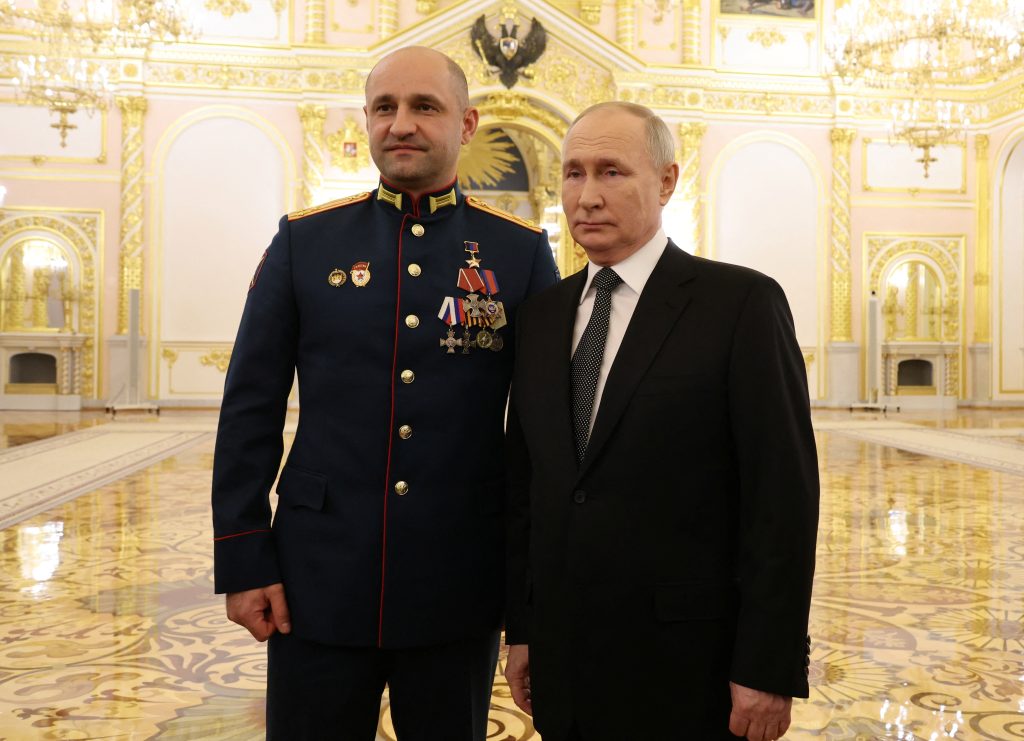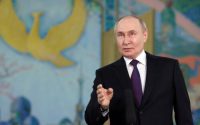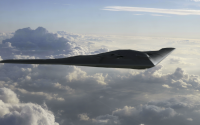Russian War Report: Putin to run for re-election in annexed regions of Ukraine
As Russia continues its assault on Ukraine, the Atlantic Council’s Digital Forensic Research Lab (DFRLab) is keeping a close eye on Russia’s movements across the military, cyber, and information domains. With more than seven years of experience monitoring the situation in Ukraine—as well as Russia’s use of propaganda and disinformation to undermine the United States, NATO, and the European Union (EU)—the DFRLab’s global team presents the latest installment of the Russian War Report.
Security
Russian conscription roundups target students and migrants to replenish armed forces
Russian military police detain “deserter” in Armenia, igniting sovereignty concerns
Tracking narratives
Putin announces presidential bid and election plans in annexed Ukrainian regions
Media policy
Moscow bans QR codes on billboards following anti-Putin campaign
International response
Blockade of Poland-Ukraine border crossings slows transportation of military and humanitarian aid
Russian conscription roundups target students and migrants to replenish armed forces
On December 6, the Russian project to help evacuate men fleeing conscription, “Идите лесом!” (Get lost!), published figures indicating that more than seventy-three conscription roundups in Russia targeted students. According to an article by Russian opposition media outlet Doxa, quoting an interview with “Get Lost” initiative founder Ivan Chuvilyaev, “summons [to military commissariats] were distributed in universities, residence halls, public transportation, work locations, and public places.”
In addition, several news reports have suggested that roundups organized by Russian law enforcement have targeted migrant populations throughout the Moscow region and in other cities. According to reports by Radio Free Europe/Radio Liberty and Doxa, Russian police issued conscriptions on November 17 in Balashikha, on November 23 in Elektrostal, on December 6 near Saint Petersburg, and on December 11 in Yekaterinburg and in Saratov. In most cases, a handful of men were given conscription notices to visit military commissariats. In a December 11 article on the Saratov roundup, Doxa noted that “in September 2022, Russia simplified the process of obtaining citizenship for migrants who fought in Ukraine.” The media outlet also reported that new military commissariats have been opened next to migration centers.
Additionally, BBC reported that Russian authorities issued conscription notices to refugees who were detained after trying to cross Russia’s border with Finland. Following tensions at the border, Helsinki closed all of its border crossings with Russia in late November. After briefly reopening part of the border with Russia on December 12, Finland again closed all Finnish-Russian border crossings on December 14, citing a renewed influx of migrants. DFRLab previously reported on concerns raised by Finnish and Estonian authorities over what they believe is a manufactured migration crisis orchestrated by Russia; Estonian Foreign Minister Margus Tsakhna referred to the tactic as “hybrid war.”
Further, BBC reported that migrants arrested near the Finnish border with expired Russian visas alleged that Russian authorities in the republic of Karelia proposed that they enroll in the Russian army or join as mercenaries in exchange for their liberty.
Moreover, the Russian opposition Telegram channel SOTA found evidence of war supporters inciting Russians to report migrants who recently acquired Russian citizenship. In a December 11 Telegram post, the channel shared a poster that reads “If your neighbor is a migrant, call the military commissariat.”
—Valentin Châtelet, research associate, Brussels, Belgium
Russian military police detain “deserter” in Armenia, igniting sovereignty concerns
In an extraterritorial operation, Russian military police in Armenia arrested Russian citizen Dmitry Setrakov on desertion charges and transported him to a Russian military base in Gyumri, Armenia. Previously a contract soldier in Russia, Setrakov reportedly moved to Armenia following Russia’s 2022 invasion of Ukraine.
In a December 8 post, the Armenia branch of the human rights organization Helsinki Citizens’ Assembly revealed that a criminal case concerning desertion had been initiated against Setrakov in Russia. The organization’s director, Artur Sakunts, denounced the arrest as an infringement of Armenia’s legal system, asserting that only Armenian law enforcement agencies have the right to arrest people within the country. According to Sakunts, Russian military police claimed that the arrest was pursuant to an order from Russian President Vladimir Putin to apprehend all defectors.
In an interview with Radio Liberty/Radio Free Europe, Sakunts urged the country’s authorities to block Setrakov’s extradition to Russia, to “bring him back under Armenia’s legal protection” and to launch a criminal investigation “into the unlawful actions carried out by members of the Russian military police on Armenian soil.”
This appears to be the first incident involving Russian security forces detaining an escaped serviceman in another country. Previous cases in Armenia involving Russians accused of desertion or evasion of military service were handled by Armenian police, Ekho Kavkaza reported, citing Bот Так.
—Eto Buziashvili, research associate, Tbilisi, Georgia
Putin announces presidential bid and election plans in annexed Ukrainian regions
Putin officially declared his candidacy for the Russian presidential elections scheduled for March 15-17, 2024. The announcement took place on December 8 during the Day of Heroes of the Fatherland ceremony at the Kremlin, where Artem Zhoga, parliament chairman of the self-proclaimed Donetsk People’s Republic, urged Putin to run.
“I won’t conceal that I entertained different thoughts at various times. However, as you rightly pointed out, now is when a decision must be made. I have decided to run for president of the Russian Federation,” Putin pronounced.
The Central Election Commission, following consultations with the Ministry of Defense and the Federal Security Service, confirmed the possibility of holding Russian presidential elections in the “new territories” with martial law in effect. This includes Donetsk, Luhansk, Zaporizhzhia, and Kherson, which were annexed by Russia in 2022 through illegal referenda.
“As the history of conducting elections and referendums has demonstrated, all procedures can be successfully implemented in these territories. The requisite security measures can be guaranteed through legislation and local resources by organizing effective election campaigns,” claimed Dmitry Vyatkin, the first deputy head of the United Russia faction in the State Duma.
Ukraine condemned the Kremlin’s plans, deeming them “null and void.” According to a statement from the Ministry of Foreign Affairs of Ukraine, observers of “these pseudo-elections” will face criminal responsibility in line with Ukrainian legislation.
“Holding Russian elections on Ukrainian territories grossly violates the Constitution and legislation of Ukraine, the norms and principles of international law, in particular the UN Charter. Such an electoral process, like other similar propaganda activities in the past, will be null and void,” the statement said.
Two days after announcing the date for the presidential elections, Duma member Vasily Piskaryov accused NATO of interference, claiming that the Alliance is activating provocateurs and agents of influence in Georgia and the Baltic states in response to the launch of Putin’s presidential campaign.
“There are attempts to carry out illegal activities in our country during the election campaign, including the training of provocateurs. Corresponding trainings are being organized, notably in the Baltic countries and Georgia for ‘pseudo-observers’ as well as for the so-called ‘journalists in exile.’ These activities are funded through organizational and grant support, financed, among others, by the German Foreign Ministry,” Piskaryov claimed.
—Sopo Gelava, research associate, Tbilisi, Georgia
Pro-Russia disinformation campaign exploits Cameo and US celebrities to push anti-Zelenskyy narrative
Microsoft’s Threat Analysis Center discovered a Russian influence operation exploiting video messaging platforms such as Cameo, where celebrities are paid to create personalized video messages for fans. It appears the videos in this case are being used to try to discredit Ukrainian President Volodymyr Zelenskyy.
According to Microsoft, the campaign from “Russia-aligned influence actors” involves soliciting video messages from celebrities addressed to “Vladimir” and urging him to seek treatment for a substance abuse problem. The messages aim to further a long-running fabricated narrative that Zelenskyy has a substance abuse issue.
The videos were shared within pro-Russia social media circles before being magnified by Russian state-affiliated and state-run media outlets, who framed the videos as messages directed at Zelenskyy. In some instances, the campaign operator added media outlet logos or celebrity social media handles, likely to gain unearned credibility by impersonating the media outlet.
Between July and October 2023, pro-Kremlin social media channels circulated at least seven videos featuring US celebrities, though the DFRLab could not determine why such an operation would employ so many of them given they are likely not very well known outside of the United States. The videos are still available on various online platforms.
Despite the long-standing dissemination of false claims by Kremlin officials and Russian state-sponsored disinformation regarding Zelenskyy’s alleged “substance abuse struggles,” this campaign signifies a novel tactic by Russia-aligned actors seeking to discredit the Ukrainian president and undermine international support for the country.
—Eto Buziashvili, research associate, Tbilisi, Georgia
Moscow bans QR codes on billboards following anti-Putin campaign
The Moscow Department of Media and Advertising has prohibited billboard owners from adding QR codes to advertisements, according to the Russian independent outlet SOTA. This move comes in the wake of a political campaign by the Anti-Corruption Foundation (FBK), an organization spearheaded by Russian opposition figure Alexei Navalny.
FBK placed billboards in Moscow and other cities; the billboards incorporated QR codes that directed individuals to the website of an anti-Putin campaign, bearing the message “RUSSIA, HAPPY NEW YEAR. HAPPYNEWRUSSIA.INFO.” They were promptly removed by authorities shortly after their installation.
These billboards featured a QR code accompanied by a “16+” sign, indicating that the destination website was for people sixteen or older. Reportedly, the QR code initially led users to a politically neutral resource before redirecting them to another website showcasing FBK’s campaign, titled “Russia without Putin.” The website for the “Russia without Putin” campaign states, “For Putin, the 2024 elections serve as a referendum on the approval of his actions and the approval of the war.” The campaign proposes that supporters join Navalny’s underground headquarters, participate in street agitations, and use an automated calling machine to cold-call and raise awareness. They also encourage people to send donations for the purchase of advertising on Telegram and for making calls to Russians. (Meanwhile, Navalny’s whereabouts are currently unknown, as Russian authorities claim that he is being transferred between prisons.)
—Eto Buziashvili, research associate, Tbilisi, Georgia
Blockade of Poland-Ukraine border crossings slows transportation of military and humanitarian aid
On December 11, Ukraine’s customs service claimed on Telegram that Polish truck drivers had ended their strike and declared the Yahodyn-Dorohusk crossing on the Ukraine-Poland border unblocked. However, on the same day, the Polish truckers claimed that they had not finished their protest and, as Voice of America reported, they were planning to take legal action “against a reported local order disbanding one stoppage.”
Polish truckers have blocked the four main land crossings between Poland and Ukraine since November 6. The truckers are demanding the reintroduction of a permit system for Ukrainian drivers to operate within the European Union (EU). Polish truck drivers argue that their business has been negatively impacted by Ukrainian drivers offering lower prices to EU clients for transporting cargo. During a meeting of EU transport ministers on December 4, Poland asked the EU to reinstate permits for Ukrainian drivers, but the European Commission said such an action would not be possible, as it would breach an existing agreement concerning the carriage of freight by road between the EU and Ukraine. Truckers in Slovakia have also joined Poland’s truckers and enacted a similar blockade of crossings on the Slovakia-Ukraine border on December 1.
Although Polish truckers claimed that they were not preventing military transports or humanitarian aid from reaching Ukraine, the border blockade has reportedly caused delays, according to representatives of Ukrainian charity organizations. On December 6, Taras Chmut, head of Ukrainian military aid foundation “Come Back Alive,” told Reuters that hundreds of drones and dozens of night-vision systems procured for the frontline were stuck at the Poland-Ukraine border for weeks. Ivan Poberzhniak, head of procurement and logistics at “Come Back Alive,” told Voice of America that around two hundred pickup trucks, which were needed to transport ammunition and evacuate the wounded from the frontline, were blocked at the Poland-Ukraine border.
Viktor Dolhopiatov, who, according to Reuters, runs an enterprise making equipment for the Ukrainian Armed Forces, argued that the blockade on the Poland-Ukraine border had delayed supplies of parts for machines to his factory, including components used in drone engines and radio stations. Oleksandr Zadorozhnyi, operational director of KOLO Charity Foundation told PBS News that due to the border blockade, drones were delayed by two to three weeks. Anatoly Akulov, manager of charity foundation “Ukraine in Armor,” told Ukrainian National News that fishing nets, which are used as anti-radar nets on the frontline, have also been delayed for three weeks due to the blockade. Earlier in December, Polish truckers also halted the delivery of military patrol boats, provided to Ukraine as part of a US government aid program.
—Givi Gigitashvili, research associate, Warsaw, Poland
Image: Russia’s President Vladimir Putin and Commander of the Sparta Battalion Artyom Zhoga pose for a picture after a ceremony to present Gold Star medals to service members, bearing the title of Hero of Russia and involved in the country’s military campaign in Ukraine, on the eve of Heroes of the Fatherland Day in Moscow, Russia, December 8, 2023. Sputnik/Mikhail Klimentyev/Kremlin via REUTERS



